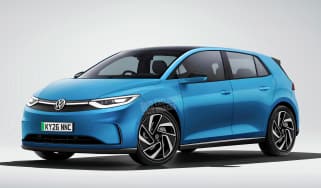Honda CR-V
We get an early taste of the new Honda CR-V to see if it's still a contender in the compact SUV class

The new CR-V is an improvement over the old model. But does it move the game on far enough? While it looks good, others offer more style. And although it drives competently, it never sets the pulse racing. The steering in particular is excessively light. Fans will lap it up, but we can’t see it winning over many new buyers when the competition is so stiff.
As compact SUVs get funkier, fresher and ever more daring, the Honda CR-V seems in danger of being left behind, which is slightly ironic given that it was one of the pioneers of the class when it debuted in 1995. Now a new model is being launched in the hope it can regain some momentum.
The 2012 CR-V goes on sale in Honda’s home market of Japan in two weeks’ time, with a European-spec version scheduled to arrive here by this time next year.
And it will have a key role to play, as Honda looks for an upturn in its fortunes. The firm’s UK sales have almost halved to around 50,000 over the last three years, with the past 12 months proving especially problematic due to supply problems caused by the Japanese tsunami. Alongside the Civic, the CR-V will be tasked with increasing this figure significantly.
More reviews
Car group tests
In-depth reviews
Long-term tests
Road tests
- Honda CR-V Advance Hybrid 2023 review
- Honda CR-V e:PHEV Advance 2023 review
- New Honda CR-V Hybrid 2019 review
Used car tests
So what can we expect from the newcomer? Well, the styling has been sharpened up, with the lower roofline helping to create a more dynamic look, and a near vertical hatchback. The grille is bolder, too. It’s a handsome car and still very obviously a CR-V, but undeniably restrained when you consider what Kia has done with the Sportage, Ford with the next Kuga and Range Rover with the Evoque. Bosses freely admit their policy has been: “If it ain’t broke, don’t fix it” – so given its continued strong sales in both the US and Japan, perhaps an approach of evolution rather revolution is to be expected.
Despite the lower roofline and the fact the Japanese-spec car is 30mm shorter than the outgoing car, the cabin is roomier than before. But hard plastics at the top of the dashboard seem out of kilter with the rest of the interior, which maintains Honda’s usual high standard for build quality. These will be replaced by softer plastics for Europe.
The model we drove was designed for the Japanese market, and featured some key differences from the car due to go on sale in Britain in around 12 months’ time. The suspension settings seem certain to be tweaked to deliver a softer ride – even on a tame road course at Honda’s Twin Ring Motegi facility in Japan, it felt harsher than you might have expected.
Refinement will be improved too – at the low speeds of our brief test drive, noise filtered through to the cabin too readily for our liking.
The Japanese market model is fitted with 2.4-litre four-cylinder petrol engine delivering around 180bhp and 240Nm of torque. It performs adequately, but the CR-V never feels especially sprightly. The UK engine line-up will comprise Honda’s new 1.6-litre diesel, a 2.2-litre diesel and 2.0 petrol.
The biggest bugbear, though, is the electrically assisted power steering. It is extremely light, making low-speed manouevres such as parking simple, but offering little in the way of feedback when you up the pace.
Among the technical upgrades is a more advanced four-wheel-drive system. It’s now lighter, to improve fuel economy, and electronically regulates the torque distribution to the rear wheels.
An Eco Assist mode is also new. You simply press a button to go into fuel-saving mode, and a dash displays how economically you are performing.
All in all, the new CR-V delivers a familiar, competent package. But it’s merely a step forward rather than the major advance we were hoping for.







